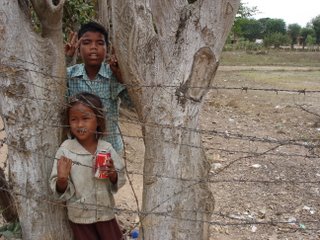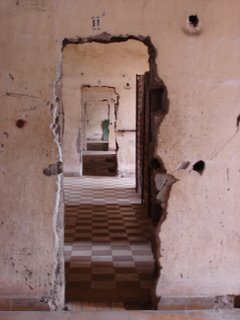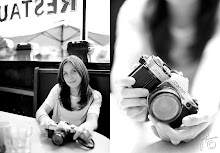Phnom Penh
 On the drive in to Phnom Penh, an older Cambodian man sat next to me on the bus. I assumed he spoke no English. At one point I motioned to ask if he would like the curtain closed to keep the sun off his face. I was shocked when he replied with the most perfect "Pardon me?"
On the drive in to Phnom Penh, an older Cambodian man sat next to me on the bus. I assumed he spoke no English. At one point I motioned to ask if he would like the curtain closed to keep the sun off his face. I was shocked when he replied with the most perfect "Pardon me?" It turns out that has been living in the US for the past 30 years and was just home visiting. Talking to him, I learned so much about what the Cambodian people suffered through. His brother and sister were murdered by the Khamer Rouge because they were fairly high ranking military staff. He's not sure how or where they died. All he was told was that the Khamer Rouge came to his house and took them away. I am certain that their death was probably quite brutal given that the Khamer Rouge did not like to "waste" bullets and instead chose to bludgeon their victims to death with sticks and hoes. He himself would have been killed by the Khamer Rouge because of his military family and his high education but he found his way to a refugee camp and was eventually sen
 t to Los Angeles.
t to Los Angeles. I can't even imagine what it would be like to arrive in a foreign country where you have no money, you do not speak the language, you don't know a single person and your family has been murdered. He claims that it was not difficult, that you do what you need to do to survive, but I could tell that he was sad thinking about it. Despite his high education in Cambodia, he was forced to become a machinist in LA. His credentials meant nothing in America. He married a Cambodian woman and they had a little girl. When she got sick he did not know what to do because he could not speak or understand English. He had to bring his daughter to the hospital and hope that everything would be ok.
He was so nice to me on the ride. At one of the rest stops he bought some Cambodian food to share with me and when we arrived in Phnom Penh he seemed concerned for my safety. He asked if I would like to stay at the hotel with he and his daughter. I declined, I told him that Annie and I were going to be staying together so there was no need to worry. He gave me his cell phone number and negotiated a great rate for our room and ride by bargaining hard in Khamer.
So after this encounter, the killing fields in Phnom Penh seemed to hold a different more human feeling for me. Suddenly, seeing thousands of skulls piled inside the monument at the killing fields outside the city - many with large cracks and holes in them - made me wonder if one of these people had been his brother. When I walked past the holes labeled "Mass Grave. 889 bodies of headless, naked women and children" I wondered if one had been his sister. When we walked past the gallows, I wondered if his family had been hung. It made it all a little more real.

That afternoon Annie and I visited a local school that had been converted into prison under Pol Pot. The rooms had been preserved - with tiny wooden cells and all sorts of instruments to torture prisoners with. Several of the larger rooms held rows of photos taken of each of the victims before they were murdered - thousands of black and white headshots of frightened looking men, women and children. I have to admit, I walked around the museum in a bit of a daze.
That evening Annie and I met up with a Canadian girl who is in med school at U of T and went for drinks at a rooftop patio overlooking the river, watching thousands of motorbikes stream past. There was a beautiful sunset that I would have loved to enjoy, but the day weighed pretty heavy with us and I didn't feel much like celebrating after everything we had seen.
It seems to be a little bit of a theme for this trip - the juxtaposition of the worst of people (Hiroshima atomic bombs and the Khamer Rouge) and the best of people (Australian saviours and kind Cambodian men). I'm glad that despite some horrible reminders of how evil people can be, I still hold on to the idea that I think people are inherently good.


0 Comments:
Post a Comment
<< Home